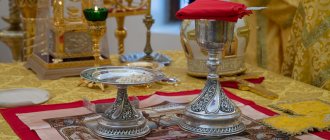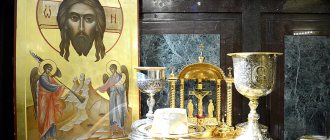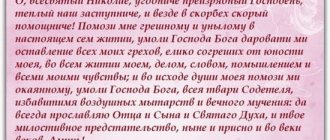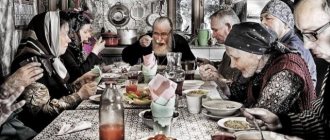The basis of the basics is the Sacrament of Communion
Communion is the main Sacrament of the Orthodox Church and the core of the life of every Christian. This is the basis of a person’s faith, the foundation of his spiritual growth. When comprehending the greatness and importance of this Sacrament, an Orthodox person often has questions. For example, “what is not allowed after Communion?”, “what can be done after Communion?” etc. To answer them, let's consider what the meaning and essence of Communion is.
“This Meal is the engine of our soul, the power that binds our mind, the basis of boldness, hope, salvation, light, life” (St. John Chrysostom).
Sacrament of Communion
Why do you need to take communion? Should there be special sensations after communion?
And the further a person moves away from God, the closer he is to the devil. Hence – illnesses, problems at work and in the family, etc.
Go to the temple of God more often, confess and receive communion. Pray to God earnestly, ask Him to help you find a way out of this situation, ask Him for protection, to guide your life.
Pray for both the living and the dead. In each “Prayer Book” in the “Morning Prayers” in the prayer “For the Living,” it is listed for whom we should pray daily: “Save, Lord, and have mercy on my spiritual father (name), my parents (names), relatives (names), bosses (names), mentors, benefactors (their names) and all Orthodox Christians.” Pray for your employees and bosses – be sure. Before work, read prayers before starting any good deed. When getting a new job, take a blessing from the priest.
Pray every day. Read the 90th Psalm and the prayer “May God rise again” (found in prayers for those coming to bed). Try to read the Gospel, the epistles of the apostles, and psalms throughout the day. Drink holy water on an empty stomach in the morning and eat a piece of prosphora. You can also wash your face with holy water. Pray, the Lord will help you cope with all the problems in life.
A prayer rule should not be a rule for the sake of a rule. The prayers in the prayer book are only examples that we should follow. The prayer should not be “read out,” but pronounced, paying attention to every word. If you cannot pray attentively according to the prayer book, it is better to pray to God in your own words, tell about what hurts your soul, as if you were telling about it to your beloved and loving father or another close and understanding person. Prayer should not be reading texts; prayer is our conversation with God. Real live conversation. It's important not to forget this. A living prayer from the heart will never go unanswered.
It may take a long time of repentance and prayer before you feel relief from your condition. The living Lord looks at our heart and soul, and therefore our offering and service to the Lord must be living, coming from a pure heart and humble soul. The main thing is to ask with all your heart in faith. The Lord will help you.
God bless you!
Communion is the main Sacrament
Christ said:
“I am the bread of life” (John 6:48). “He who eats My flesh and drinks My blood has eternal life, and I will raise him up at the last day” (John 6:54).
The apogee of words incomprehensible to the Apostles at that time was the so-called Last Supper.
On the eve of the Jewish Passover, Jesus already knew that “the hour” of His suffering on the cross was drawing near. He gathered His disciples for the last time in the Upper Room of Zion. Here, according to the Old Testament tradition, He celebrated the Passover dinner, dedicated to the memory of the exodus of the Jewish people from Egypt.
Every year all Jews celebrated this holiday of deliverance from Egyptian enslavement. Jesus Christ, preparing with His death on the cross to bring liberation from the slavery of sin, gives Easter a new meaning.
Taking bread, He broke it and said: “Take, eat: this is My body” (Matthew 26:26). Then he handed the disciples a cup of wine with the words:
“Drink of it, all of you, for this is My Blood of the New Testament, which is shed for many for the remission of sins” (Matthew 26:27-28).
This is how the first Communion was celebrated in the Zion Upper Room two thousand years ago. Having transformed wine and bread into His Divine Body and Blood, Christ commanded: “Do this in remembrance of me” (Luke 22:19).
From that moment on, the Sacrament of Communion has occupied a central place in the worldview of Christians. Archpriest Grigory Dyachenko calls Him “the focus of the mysteries of the Christian Church.”
“O Sacrament, the most sacred of all Sacraments, surpassing the Sacrament of Baptism itself. With this Baptism, the Bishop communicates with us only in strength (in energy), and with this Eucharist - in essence” (Patriarch Gennady Scholarius (c. 1400).
Each Liturgy, at which Communion is celebrated, is a reminder of Christ’s sacrifice for the sins of all mankind. He voluntarily gave His Most Pure Body and Blood,
“That whoever believes in Him should not perish, but have eternal life” (John 3:16).
The Sacrament of Communion - union with Christ
The very name of the Sacrament reveals its meaning. By receiving communion, a person, no more and no less, becomes a part of God Himself, a participant in Divine grace. Jesus Christ testified to this:
“He who eats My Flesh and drinks My Blood abides in Me, and I in him” (John 6:56).
Communion gives a person the opportunity already here, in earthly temporary life, to unite with God.
“Communion connects us with the Master Himself, and in this Sacrament we actually become partakers of His very Body and Blood. We became mortal through food, and fell from paradise, and separated ourselves from God, and now through communion we again accept eternal life. Thus, freeing ourselves from corruption, we unite with the Immortal God, Who for our sake became mortal in the incarnation” (Archbishop Simeon of Thessalonica).
The transformation of bread and wine into the Body and Blood of Christ is the great mystery of the universe, inaccessible even to the Angels. Only for the sake of man, for the sake of his salvation from sin and death, Christ endured the suffering of Calvary.
“Shed on the cross, this Blood washed the entire universe... This Blood is the salvation of our souls. The soul is washed by it. It makes our mind brighter than fire. It makes our soul purer than gold. This Blood was shed and made heaven accessible to us...” (St. John Chrysostom).
And at every Liturgy, human nature is united with Divine grace. Through partaking of the Holy Gifts, a Christian receives strength to fight his sinful passions. Only in this way does he find healing of the soul and inherit Eternal Life.
“The grace given to us by Communion is so great that no matter how unworthy and no matter how sinful a person may be, if only in the humble consciousness of his total sinfulness he approaches the Lord, who redeems us all, even if covered from head to toe with the sores of sins, and He will be cleansed by the grace of Christ, become more and more bright, will be completely enlightened and saved” (Reverend Seraphim of Sarov).
Why does one feel weak in church and want to sleep?
Many people come to church services, and the premises are not always large. Based on the biological needs of a person, he needs oxygen, which decreases every hour. The burning of candles and the crowd of people leave him less and less. Insufficient oxygen supply to the brain will cause weakness and the desire to yawn. But this does not mean that you want to sleep - this is how the brain tries to regulate the functioning of the body.
The monotonous speech of the clergyman, detachment from external bustle, evokes complete calm. At such moments it can be difficult to concentrate on prayer, and this is already considered a sin. When you come to church, you need to be with God and not think about extraneous things.
In moments of weakness, you can read “Our Father” or try to repeat the words after the priest. Before going to church, you can familiarize yourself with the canons that will be read at the service. Then the actions will be more understandable, and will not cause fatigue from standing and listening for a long time.
Removal from prayer in church may be the work of the evil one, who is trying with all his might to prevent a person from taking the righteous path. There is a weakness through which the unclean will try to turn the Lord away from the salvation of the soul. In this regard, there is a sign that if yawning occurs without the desire to sleep, then the person may have signs of magical depravity.
Subject:
- Orthodoxy
Communion is the air of a Christian
A person becomes a Christian in the full sense of this concept precisely in the Sacrament of Communion. It is a necessity of the spirit, the existence of the soul, a necessity of the body.
In the prayer said by the priest before Communion, we hear the words: “for the healing of soul and body.” In the Sacrament of the Eucharist, the believer receives not only spiritual strength, but also physical health. There are many known cases of miraculous healing of diseases after receiving the Mysteries of Christ. It is natural for a Christian to turn to the “Physician of souls and bodies” when sick.
However, it is important to remember that Communion is not a magical cure for illness and failure. This is the Sacrament that unites us with God. His main goal is to inherit the Kingdom of Heaven. And often only through illness and infirmity does a person begin to realize the sinfulness of his life, acquire humility and truly come to God.
Therefore, it is important to protect yourself from a consumerist attitude towards the Sacrament of Communion. This is not a magic pill that guarantees a happy life. After Communion one cannot expect immediate miracles.
The Holy Gifts are the Body and Blood of the Lord, Who conquered death through crucifixion on the Cross. The suffering of the cross opened the door to Paradise for humanity. Perhaps our small earthly hardships, according to God’s Providence, will become a passport to Eternal Life.
“The Lord gives each participant what he needs at the moment. For some, it is a joy for a person inspired by Holy Communion to move on with greater confidence. And for some, trials and difficulties, because we join not for temporary well-being, but for eternal well-being, which cannot be achieved without patiently bearing our own cross” (priest Valery Dukhanin).
Feelings after Communion
By receiving communion, a person lets Christ into himself. The blood of the Lord begins to flow in our veins, and our human nature is, as it were, deified.
Realizing all the greatness and mystery of what is happening, a Christian can begin to look for special grace-filled sensations and experiences in himself after receiving the Mysteries of Christ. However, it is important to remember that these types of thoughts are temptations after Communion. According to Archimandrite Markell (Pavuk):
“The essence of the Sacrament is not to experience delight. It’s about conquering yourself, your sins and passions, with God’s help, and becoming closer to the Lord and other people.”
There is no need to expect unearthly experiences and sublime sensations. Subsequently, such feelings can become an end in themselves, overshadowing the very essence of Communion. That is, direct union with Christ.
Trying to artificially evoke feelings of delight or tenderness in oneself, a person can fall into delusion (self-deception about one’s own false holiness). He will begin to consider himself chosen, awarded special Divine gifts.
There is another side to this temptation. Striving for some special experiences and not receiving them, a person can become disappointed, fall into the grave sin of despondency and even lose faith.
On this occasion, Theophan the Recluse said:
“Many desire in advance to receive this and that from Holy Communion, and then, not seeing it, they are confused and even waver in their faith in the power of the Sacrament. And the fault is not in the Sacrament, but in these unnecessary guesses. Do not promise yourself anything, but leave everything to the Lord, asking Him for one mercy - to strengthen you for every good thing to please Him.”
The main measure of a Christian’s spiritual life should not be excitement and delight, but meekness, humility, spiritual peace and love.
Temptations associated with Communion
Communion. Photo: A. Goryainov / Expo.Pravoslavie.Ru
The Holy Mysteries - the Body and Blood of Christ - are the most precious Shrine on earth. Already here, in the realities of the earthly world, the Eucharist introduces us to the benefits of the Heavenly Kingdom. Therefore, a Christian should try to be especially vigilant regarding this Sacrament. There are temptations that await a Christian who wishes to receive communion. You need to know them, and you need to protect yourself from them. Some temptations precede our reception of the Holy Mysteries, while others follow Communion.
For example, one of the main temptations, very common these days, is associated with assessing the personal qualities of the priest performing the Liturgy. Thus, an invisible enemy is trying to sow rumors among believers about the sins of clergy and that not every priest can receive communion. If they notice shortcomings in a priest, then for some reason they think that such a person does not need to receive communion and that the grace of Communion will be diminished from this.
The Fatherland tells the story of how a presbyter from a nearby church came to a certain hermit and taught him the Holy Mysteries. Someone, visiting the hermit, told him about the sins of the presbyter, and when the presbyter came again, the hermit did not even open the door for him. The presbyter left, and the elder heard a voice from God: “People have taken My judgment for themselves.” After this, the hermit was given a vision. He saw a golden well with unusually good water. This well was owned by a leper who drew water and poured it into a golden vessel. The hermit suddenly felt unbearable thirst, but, abhorring lepers, did not want to take water from him. And again a voice came to him: “Why don’t you drink this water? What does it matter who draws it? He only draws and pours into the vessel.” The hermit, having come to his senses, understood the meaning of the vision and repented of his action. Then he called the presbyter and asked him to teach Holy Communion as before. So, before Communion, we should think not about how pious the priest performing the Sacrament is, but about whether we ourselves are worthy of being partakers of the Holy Gifts.
The Holy Mysteries are not the personal property of the priest. He is only a minister, and the administrator of the Holy Gifts is the Lord Himself
Let us remember that the Holy Mysteries are not the personal property of the priest. He is only a minister, and the administrator of the Holy Gifts is the Lord Himself. God acts in the Church through the clergy. Therefore, St. John Chrysostom said: “When you see that a priest is teaching you the Gifts, know that... it is Christ who is stretching out his hand to you.” Shall we reject this hand?
It happens that Christians who regularly partake of the Holy Mysteries, trying to lead an attentive spiritual life, are suddenly tempted by unclean and blasphemous thoughts. The invisible enemy is trying to defile the mind of a Christian with his obsessions, and through this, disrupt his preparation for Communion. But thoughts are like the wind that blows regardless of our desire. The Holy Fathers command not to focus attention on incoming thoughts, so as not to get bogged down in constant internal confrontation. The more we chew on a thought, the more real it becomes in our soul and the more difficult it becomes to resist it. It is better to ignore all mental excuses, and enclose the mind in the words of prayer, knowing that the approaching thoughts are not ours, but the enemy’s. Attentive, warm prayer dispels the twilight of evil attacks, the soul is freed from mental oppression and finds blessed peace.
Photo: Yu. Kostygov / Expo.Pravoslavie.Ru
Such temptation is also possible in our spiritual life. A Christian diligently prepares to receive the Holy Mysteries, fasts, abstains from worldly amusements and affairs, and carefully prepares for Confession. But as soon as he took communion, he joyfully threw off all spiritual labor, as if it were an extra, unnecessary burden. He naively hopes that the received grace will now itself protect and cover him without any effort on his part. As a result, relaxation sets in, a person easily stumbles and again plunges into the cycle of worldly vanity. Carelessly relying on God's help, such a person soon loses the gifts of Holy Communion. It is important to remember that God's grace does not save us without us. And in the ascetic teaching of the Church there is the concept of “synergy”, that is, “co-laboration”. The Lord creates and transforms the soul with our constant personal effort, participation, and assistance.
There is a temptation of the opposite nature. Seeing that some time after the Sacrament the sinful dust again settles on our soul, a cowardly person despairs and decides that there was little point in the Sacraments of Confession and Communion. What is the point of going to the Sacraments when sin still manifests itself in us? However, if we did not confess and receive communion, then we would not notice anything sinful in ourselves, we would lose sensitivity to sin and would begin to treat ourselves and our salvation completely indifferently. A ray of sun, penetrating into a room, shows how much dust is in the air, so in the light of the grace of the Sacraments, our shortcomings and infirmities become visible.
Spiritual life is a continuous struggle against evil, a constant solution of the tasks that life puts before us, the implementation of God’s will under any conditions. And we must rejoice that, despite our constant stumblings, the Lord gives us the opportunity to be cleansed from sins and ascend to the blessings of eternal life in the Sacrament of Communion.
This is a temptation to expect that the grace of the Sacrament will certainly produce an otherworldly feeling in the soul.
You can often encounter such a temptation. The communicant specifically expects that the grace of the Sacrament will certainly produce in him some special, otherworldly feeling, and begins to listen to himself in search of sublime sensations. Such an attitude towards the Sacrament hides behind it a barely recognizable egoism, since a person measures the effectiveness of the Sacrament by a personal inner feeling, satisfaction or dissatisfaction. And this, in turn, poses two threats. Firstly, the person receiving communion can convince himself that some special feelings actually arose in him as a sign of a Divine visit. Secondly, if he did not feel anything otherworldly, he becomes upset and begins to look for the reason why this happened, and falls into suspiciousness. This is dangerous, we emphasize once again, because a person himself creates special “graceful” sensations in himself, internally enjoying the work of his own imagination, or, out of suspiciousness, eats himself away.
In such situations, it is important to remember that spiritual life is not based on feelings and sensations, which can be deceptive, but on humility, meekness and simplicity. Saint Theophan the Recluse said in this regard: “Many desire in advance to receive this and that from Holy Communion, and then, not seeing it, they are confused and even waver in their faith in the power of the Sacrament. And the fault is not in the Sacrament, but in these unnecessary guesses. Do not promise yourself anything, but leave everything to the Lord, asking Him for one mercy - to strengthen you for every good thing to please Him.” It is not insight and pleasure, even through Divine grace, that should be paramount for us, but surrendering ourselves into the hands of God, humility of our will before the will of God. If God pleases, then He will, of course, give us a feeling of His grace. But, as a rule, the words of the Gospel remain effective for everyone: “The Kingdom of God will not come in a noticeable way” (Luke 17:20). Grace mysteriously and gradually accomplishes the transformation of the human soul, so that we ourselves cannot and should not evaluate and weigh how close we have already become to God. But the life of such a person is transformed, and in his actions he becomes more and more a true servant of good.
In the spiritual life of a Christian, everything should be built on sincerity, simplicity and naturalness. There shouldn't be anything complicated or artificially created here. Therefore, it is unacceptable to create special “graceful” states in your soul, to invent some incredible feelings yourself after communion of the Holy Mysteries of Christ. Perhaps the only feeling whose significance is worth paying attention to after Communion is the feeling of spiritual peace, humility, in which it is easy for us to pray to God and in which we are reconciled with our neighbors.
So, when we come to the temple, we will try to avoid focusing on our own, subjective experiences, fantasies about what we see and hear. Let us try to concentrate entirely on the Liturgy itself, to stand before God in simplicity and naturalness.
The Lord gives each participant what he needs at the moment.
Regarding temptations, one can also hear the following question: why does life’s difficulties not always ease after Communion? That is, sometimes we certainly expect that after Communion everything in our personal destiny should become even and smooth. To understand the answer to this question, we must remember that in the Sacrament of the Eucharist we partake of the Body of the crucified Lord and the Blood shed for our sins. We commune with the One who Himself suffered, and if He pleases, He leaves our burdens on us so that we too may endure our cross. However, after worthy Communion of the Holy Mysteries, the soul becomes stronger, and often what seemed an insoluble problem appears as a completely solvable matter, not presenting the difficulties that presented itself before. People who turn to God are under His special Divine Providence. The Lord gives each communicant what he needs at the moment: for some joy, so that a person inspired by Holy Communion can move on with greater confidence, and for others trials and difficulties, because we commune not for temporary well-being, but for eternal, which cannot be achieved without patiently bearing one’s own cross.
In conclusion, I would like to say about the action of the Holy Mysteries, based on one example from life. When I studied at the Moscow Theological Seminary, I often visited one old woman, nun Nina, who lived in Sergiev Posad next to the Holy Trinity Lavra of St. Sergius. She was already over 80, she suffered from many illnesses, her legs were covered with ulcers, so that Mother Nina could hardly walk. From pain and lonely life, she was sometimes overcome by murmurs, doubts, and worries. But when she confessed and received the Holy Mysteries - and she received communion at home - at that moment an amazing change always happened to her. I brought the priest to her with the Holy Gifts and remember well this regularly repeated miracle. Just before you there was an old, tired person, and after she, having confessed, received the Holy Mysteries, an amazing light emanated from her eyes, it was already a completely new, renewed, brightly transformed face, and in these peaceful and enlightened eyes there was no there was not a shadow of embarrassment, murmur, or anxiety. This light now warmed others, and her word after Communion became completely special, and all the perplexities in her soul were dispelled, so that she herself now strengthened her neighbors.
Thus, the Holy Spirit in the Sacraments of the Church gives a person purity, and purity is an unclouded, clear vision of everything and everyone, a pure perception of life. Even possessing all the treasures of the world, a person cannot become happy - and will not become so unless he acquires inner treasures and is imbued with the grace of the Holy Spirit. The Holy Church offers this ineffable gift to man in the Sacrament of Holy Communion.
What is not allowed after Communion
The Sacrament of Communion is the greatest miracle in the life of the Christian Church. In it, a person receives Divine help and grace and is cleansed of passions and sin.
Unfortunately, the Divine purity received by the believer in the Sacrament of the Eucharist can often be tainted by pseudo-church rules. Today you can hear many different kinds of “post-communion” prohibitions. For example, that after Communion you cannot kiss icons and the cross. It is supposedly forbidden to eat meat and fruits with pits. Someone somewhere heard that you can’t wash yourself or cut your nails and much more.
Priest Andrei Chizhenko calls this kind of superstition
“a near-church tradition, partially mixed with pagan magical mentality.”
Caring about such empty trifles takes us away from the main thing - from participation in the Lord Jesus Christ. It is easy to fall into discussions about such vain trifles as “is it possible to sleep after Communion” or “is it permissible to touch other people after Communion?” And then we become like the Pharisees. Those who, in an effort to keep the external part of the Law, were sentenced to death by the Lord Himself.
The main thing that you cannot do after Communion is to spend time idly, returning to your sinful habits and passions. We must not waste the invaluable gift that we received in the Sacrament of Communion.
“We forget that Communion obliges us to a lot. A person, having accepted God within himself, must live differently from how he lived before. His connection with God does not end with communion. What follows the dismissal of the Liturgy, when a person returns to the world, is very important. He returns to bring people that light and the grace that he received!” (Metropolitan Hilarion Alfeev).
Why do you want to sleep after church service?
Going to church is a habit for some because they do it regularly, while others go occasionally. After visiting the temple, such a person may feel weak or want to go to bed. The clergy do not advise doing this immediately after Communion, but rather, being with a purified mind, rethink the events of life and actions. Although they argue that sleep will not be considered a sin if a person falls down from a state of fatigue.
Why a state of weakness and fatigue occurs after visiting church is explained by the actions that take place in it. The service is a rather long event, and after hectic or busy everyday life, relaxation sets in. By listening to prayers and delving into their essence, a person moves away from the outside world, becomes closer to the events of antiquity and the trials that Jesus Christ endured.
Holy Communion allows the soul and mind to be cleansed. There is a feeling of lightness and floating. Many troubles no longer seem so acute and insoluble. The feeling of harmony inside brings peace and therefore often makes you sleepy after visiting church.
This day is special for an Orthodox person, and the rite of Communion allows you to receive enlightenment and grace from the Lord. You can understand thoughts, actions and actions hidden until this time. This is the moment when you can communicate with the Savior almost directly and he will hear prayers.











